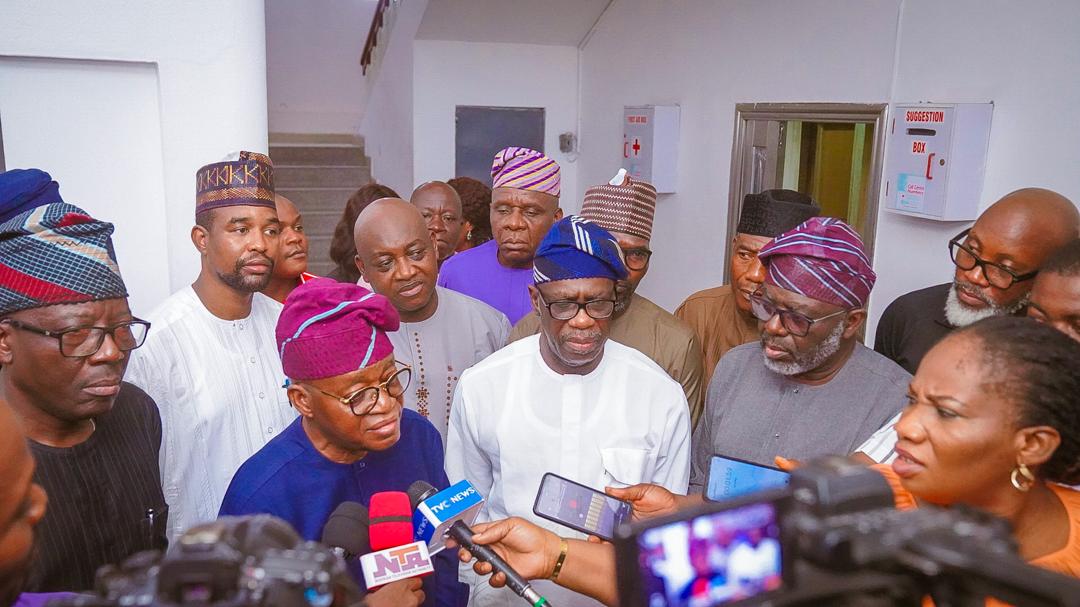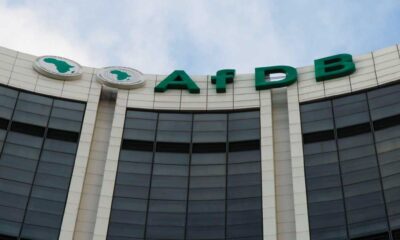Business
AfDB, African Securities exchange collaborate to promote trans-border trading
The African Securities Exchanges Association (ASEA) and the African Development Bank (AfDB) Group are collaborating to expand the number of linked African exchanges from seven to 15.
The Bank in a statement said the expansion was under the second phase of the African Exchanges Linkage Project (AELP).
According to the statement, both parties on June 28 signed an agreement for a 600,000 dollars grant for the project.
It said the funds would come from the Korea African Economic Cooperation Fund (KOAFEC) Trust Fund, managed by the AfDB.
The AELP is a flagship project of ASEA and the Bank Group to link African capital markets, thereby promoting cross-border securities trading, increasing liquidity and diversifying investment opportunities for investors.
According to the statement, AELP’s second phase will provide investors access to more than 2,000 securities listed on up to 15 capital markets.
It said this would be done through a cross-border securities trading platform tailored to the needs of regulators, central depositories, policymakers, and stockbrokers.
” Participating stock exchanges include the Botswana Stock Exchange, where the grant signing took place; the Ghana Stock Exchange and six other stock exchanges.
”The grant will also support capacity building of institutional investors and capital market operators,” it said.
Thapelo Tsheole, the President of ASEA and Chief Executive Officer (CEO) of the Botswana Stock Exchange, signed on behalf of the association.
Tsheole said: “we express our gratitude to AfDB for their invaluable support and dedication to the development of African Capital Markets.
”With the generous grant funding, we are poised to expand technical connectivity and linkage among African stock exchanges, creating a broader pan-African network.
” Together, we are working toward a fully integrated Africa for the benefit of investors, businesses and governments across the continent.”
The Bank Group’s Vice President for Private Sector, Infrastructure and Industrialisation, Solomon Quaynor, signed on its behalf.
Quaynor said: “the Bank is pleased to extend its partnership with ASEA through the follow-on support for Phase 2 of the AELP.
”The AELP is facilitating regional integration through African stock exchanges linkage amounting to up to 1.3 trillion dollars in combined market capitalisation.
” The collaboration between the Bank and ASEA through the AELP aligns with our objective of leveraging institutional investor groups and capital markets financing into infrastructure and the real sector in regional member countries.”
According to Quaynor, the objectives of the AELP align with the African Union’s Agenda 2063 and the African Continental Free Trade Agreement’s goal.
He said the goal was to establish a liberalised market to ease the movement of capital and investments and deepen the continent’s economic integration.
He said the project also advances the Bank Group’s High 5 strategic priority to integrate Africa.
The News Agency of Nigeria (NAN) reports that AfDB supported the first phase of the AELP, which was also funded with a KOAFEC grant.
Phase one supported the setup of an infrastructure interconnectivity platform involving seven stock exchanges and 31 stockbrokers.
It also offered training for more than 1,000 capital market operators.
Business
Oyetola in Lagos, defies downpour, embarks on inspection tour


By Seun Ibiyemi
The rain in Lagos began very early on Thursday morning. But the torrential rainfall did not stop Minister of Marine and Blue Economy, Adegboyega Oyetola, CON, from embarking on the tour of two key institutions that were recently brought under his ministry — the Nigerian Institute for Oceanography and Marine Research (NIOMR) and the Liaison office of the Department of Fishery and Aquaculture, which houses College of Fishery, Lagos.
His first port of call was NIOMR, where the Chief Executive of the institute, Prof. Abiodun Sule, took the Minister through some of its strategic breakthroughs, including unveiling some of the different species of fish in our waters.
The Minister charged the Institute to take up the challenge of mapping out the country’s various marine resources, saying the country needs to know what it has and in what quantity.
He charged the staff to redouble their efforts and ensure they find a solution to the rising cost of fish feeds in Nigeria. The Minister reiterated his desire to increase local production of fish, while reducing dependence on importation.
From the Institute, Oyetola and his entourage, which included the Permanent Secretary, Oloruntola Olufemi; Director, Maritime Safety and Security, Babatunde Bombata, and the Executive Director, Engineering and Technical Services, Engr. Ibrahim Umar, who represented the the MD of NPA, headed for the Department of Fishery and Aquaculture, where the delegation inspected the Laboratory and charged the staff not to lower the standard of monitoring and inspection so as to ensure the country’s exporters are not blacklisted by the International community and also ensuring that those being imported meet required standard.
He assured the staff of both institutions of his commitment to their welfare, while urging them to also increase their capacity and productivity, as he wants to see the fishing contribute to job creation and increase in revenue of the FG.
The elated members of staff promised the Minister not to let him down and pledged their commitment to the vision and mission of the Minister with respect to the maritime sector.
Business
CPPE urges CBN to halt interest rate tightening, as businesses are yet to recover from previous hikes


The Centre for the Promotion of Public Enterprise (CPPE) has called on the Central Bank of Nigeria (CBN) to slow down on monetary policy tightening ahead of its Monetary Policy Committee (MPC) meeting this month, stating that businesses are yet to recover from the hawkish monetary policy stance in the last two months.
The Centre stated this in its reaction to the latest inflation figures published by the NBS where headline inflation rose to 33.69 percent in the month of April from 33.20 percent in March.
According to the statement signed by the Director-General of the CPPE, Dr Muda Yusuf, monetary policy tools should be paused for the fiscal side of the economy to work towards addressing the supply issues affecting the inflation dynamics in the country.
He stated, “Meanwhile we urge the monetary policy Committee to soften its monetary tightening stance for the time being. Businesses are yet to recover from the shocks of the recent bullish rate hikes. The monetary instruments should be put on pause while fiscal policy tools address supply-side factors in the inflation dynamics.”
Furthermore, the Centre appreciated the slowdown in inflation for the month, especially headline and food inflation, but noted that the main drivers of price hikes (food, transport, insecurity in farming communities and other structural problems) are yet to cool down.
He explained that the drivers of inflation are supply-based and being addressed by the fiscal authorities. Also, Dr. Yusuf doubled down on his call to the Nigerian Customs Service (NCS) to set a quarterly exchange rate between N800 and N1000 for import duties assessment, noting that the continuous fluctuation has a pass-through effect on inflation.
In his words, “Meanwhile the exchange rate benchmark for the computation of import duty continues to be a major concern to businesses as it has become a major inflation driver. We again urge the CBN to peg the rate at between N800 -N1000/dollar to be reviewed quarterly. This is necessary to reduce the pass-through effect of heightening trade costs on inflation.”
Meanwhile, the CPPE also lauded the commencement of refining by the Dangote refinery, stating that it would help slow down inflation in the short term.
Recall that Nigeria’s inflation rate rose to 33.69 percent in April on the back of an increase in food and transport prices. The rate is one of the highest in about 28 years.
The CBN, in an effort to rein in inflation, has increased
Business
April 2024: FG, States, LGs share N1,208.081trn


The Federation Account Allocation Committee (FAAC), at its May 2024 meeting chaired by the Minister of Finance and Coordinating Minister of the Economy, Wale Edun, shared a total sum of N1,208.081 Trillion to the three tiers of government as Federation Allocation for the month of April, 2024 from a gross total of N2,192.007 Trillion.
From the stated amount inclusive of Gross Statutory Revenue, Value Added Tax (VAT), Electronic Money Transfer Levy (EMTL), and Exchange Difference (ED), the Federal Government received N390.412 Billion, the States received N403.403 Billion, the Local Government Councils got N293.816 Billion, while the Oil Producing States received N120.450 Billion as Derivation, (13 percent of Mineral Revenue).
The sum of N80.517 Billion was given for the cost of collection, while N903.479 Billion was allocated for Transfers Intervention and Refunds.
The Communique issued by the Federation Account Allocation Committee (FAAC) at the end of the meeting indicated that the Gross Revenue available from the Value Added Tax (VAT) for the month of April 2024, was N500.920 Billion as against N549.698 Billion distributed in the preceding month, resulting in a decrease of N48.778 Billion.
From that amount, the sum of N20.037 Billion was allocated for the cost of collection and the sum of N14.426 Billion given for Transfers, Intervention and Refunds. The remaining sum of N466.457 Billion was distributed to the three tiers of government, of which the Federal Government got N69.969 Billion, the States received N233.229 Billion, Local Government Councils got N163.260 Billion.
Accordingly, the Gross Statutory Revenue of N1,233.498 Trillion received for the month was higher than the sum of N1,017.216 Trillion received in the previous month of March 2024 by N216.282 Billion. From the stated amount, the sum of N59.729 Billion was allocated for the cost of collection and a total sum of N889.053 Billion for Transfers, Intervention and Refunds.
The remaining balance of N284.716 Billion was distributed as follows to the three tiers of government: Federal Government got the sum of N112.148 Billion, States received N56.883 Billion, the sum of N43.855 Billion was allocated to LGCs and N71.830 Billion was given to Derivation Revenue (13 percent Mineral producing States).
Also, the sum of N18.775 Billion from Electronic Money Transfer Levy (EMTL) was distributed to the three (3) tiers of government as follows: the Federal Government received N2.704 Billion, States got N9.012 Billion, Local Government Councils received N6.308 Billion, while N0.751 Billion was allocated for Cost of Collection.
The Communique also disclosed the sum of N438.884 Billion from Exchange Difference, which was shared as follows: Federal Government received N205.591 Billion, States got N104.279 Billion, the sum of N80.394 Billion was allocated to Local Government Councils, while N48.620 Billion was given for Derivation (13 percent of Mineral Revenue).
Oil and Gas Royalties, Companies Income Tax (CIT), Excise Duty, Petroleum Profit Tax (PPT), Customs External Tariff levies (CET) and Electronic Money Transfer Levy (EMTL) increased significantly, while Import Duty and Value Added Tax (VAT) recorded considerably decreases.
According to the Communique, the total revenue distributable for the current month of April 2024, was drawn from Statutory Revenue of N284.716 Billion, Value Added Tax (VAT) of N466.457 Billion, N18.024 Billion from Electronic Money Transfer Levy (EMTL), and N438.884 Billion from Exchange Difference, bringing the total distributable amount for the month to N1,208.081 Trillion.
The balance in the Excess Crude Account (ECA) as at May 2024 stands at $473,754.57.
-
Finance4 months ago
Court orders Sen. Victor Umeh to repay N136m bank debt to AMCON
-



 Abuja Update3 months ago
Abuja Update3 months agoUNDP, FG partnership needed to achieve inclusion, equity- Minister
-
capital market2 years ago
Rt.briscoe, FBNH, Others halts negative performance of stock market
-
Abuja Update2 months ago
Banks drive stock market performance with N147bn gain
-



 Health1 month ago
Health1 month agoCapacity training will reduce migration of health workers- NPHCDA
-
Submission Guidelines4 months ago
CALL FOR SUBMISSIONS: POETRY COLUMN-NND
-



 Business4 weeks ago
Business4 weeks agoTingo Group unveils Tingo Electric, Tingo Cola drink at Lagos launch
-
News4 months ago
Oil thieves sponsoring malicious media campaign against Navy – Spokesman










